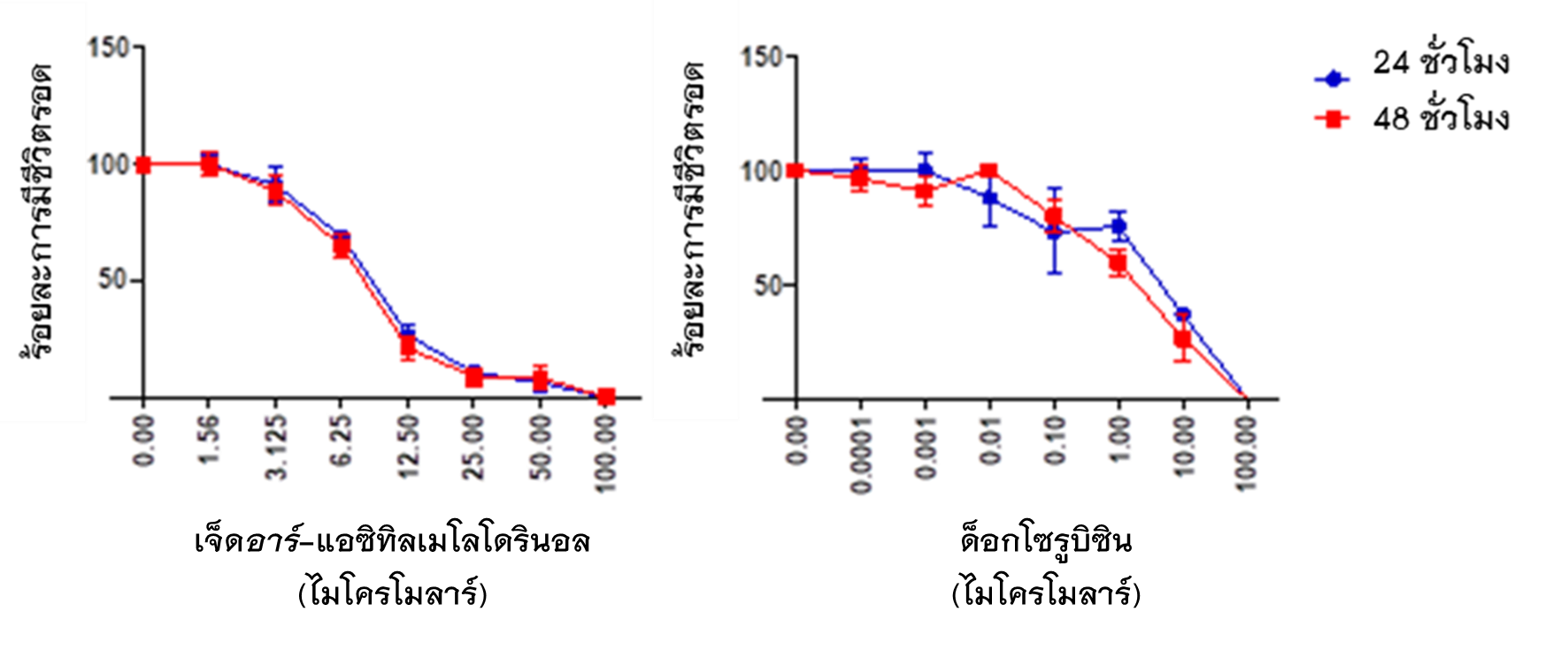Cytotoxicity against breast cancer cell line of 7R-acetylmelodorinol isolated from Xylopia pierrei Hance
Keywords:
7R-acetylmelodorinol, Breast cancer cell line, Cytotoxicity activityAbstract
7R-acetylmelodorinol is extracted and purified compound from stem bark of Xylopia pierrei Hance. Previous studies, it was reported that 7R-acetylmelodorinol has the cytotoxicity activity against human small cell lung cancer (NCI-H187). However, the cytotoxicity activity against breast cancer is still unclear. The aim of the study is to determine cytotoxicity effect of 7R-acetylmelodorinol in breast cancer cell lines. The cell viabilities of MCF-7 breast cancer cell line after treated with various concentrations of 7R-acetylmelodorinol were evaluated by crystal violet staining, MTT assay, and clonogenic assay, respectively. For the crystal violet staining, treatment cells with 50 and 100 µM of 7R-acetylmelodorinol significantly decreased cell viability of breast cancer cells for 24 and 48 hours. The IC50 of 7R-acetylmelodorinol for 24 and 48 hours in MCF-7 was 8.57±0.012 and 7.80±0.013 µM, respectively. The result of clonogenic assay revealed that colony formation showed a significant decrease in breast cancer cell treated with 7R-acetylmelodorinol at concentrations of 4 and 8 µM (p< 0.01). Taken together, 7R-acetylmelodorinol has cytotoxicity activity against breast cancer cells by three different methods. These findings suggested that 7R-acetylmelodorinol might be a useful compound for breast cancer therapy.
References
Alkhalaf M, El-Mowafy A, Renno W, Rachid O, Ali A, Al-Attyiah R. Resveratrol-induced apoptosis in human breast cancer cells is mediated primarily through the caspase-3-dependent pathway. Archives of medical research. 2008;39(2):162-8.
Núñez Selles AJ, Daglia M, Rastrelli L. The potential role of mangiferin in cancer treatment through its immunomodulatory, anti-angiogenic, apoptopic, and gene regulatory effects. BioFactors (Oxford, England). 2016;42(5):475-91.
Imran M, Arshad MS, Butt MS, Kwon J-H, Arshad MU, Sultan MT. Mangiferin: a natural miracle bioactive compound against lifestyle related disorders. Lipids Health Dis. 2017;16(1):84-.
Chokchaisiri R, Kunkaewom S, Chokchaisiri S, Ganranoo L, Chalermglin R, Suksamrarn A. Potent cytotoxicity against human small cell lung cancer cells of the heptenes from the stem bark of Xylopia pierrei Hance. Medicinal Chemistry Research. 2017;26(6):1291-6.
Nyandoro SS, Maeda G, Munissi JJE, Gruhonjic A, Fitzpatrick PA, Lindblad S, et al. A New Benzopyranyl Cadenane Sesquiterpene and Other Antiplasmodial and Cytotoxic Metabolites from Cleistochlamys kirkii. Molecules. 2019;24(15):2746.
Jung JH, Chang CJ, Smith DL, McLaughlin JL, Pummangura S, Chaichantipyuth C, et al. Additional bioactive heptenes from Melodorum fruticosum. Journal of natural products. 1991;54(2):500-5.
Hahnvajanawong C SW, Boonmars T, Vaeteewoottacharn K. Natural Products
for Prevention and Treatment of Cholangiocarcinoma. Srinagarind Med J. 2012;27(suppl (Cholangiocarcinoma)):371-80.
Hongnak S, Jongaramruong J, Khumkratok S, Siriphong P, Tip-pyang S. Chemical Constituents and Derivatization of Melodorinol from the Roots of Melodorum fruticosum. Natural Product Communications. 2015;10(4):1934578X1501000426.
Pornticha Loluphiman. Effects of acetylmelodorinol and plaunotol on cancer cell lines. Bangkok : Chulalongkorn. University, 2004. 62 p.

Downloads
Published
How to Cite
Issue
Section
License
Copyright (c) 2021 Naresuan Phayao Journal

This work is licensed under a Creative Commons Attribution-NonCommercial-NoDerivatives 4.0 International License.
ผู้นิพนธ์ต้องรับผิดชอบข้อความในบทนิพนธ์ของตน มหาวิทยาลัยพะเยาไม่จำเป็นต้องเห็นด้วยกับบทความที่ตีพิมพ์เสมอไป ผู้สนใจสามารถคัดลอก และนำไปใช้ได้ แต่จะต้องขออนุมัติเจ้าของ และได้รับการอนุมัติเป็นลายลักษณ์อักษรก่อน พร้อมกับมีการอ้างอิงและกล่าวคำขอบคุณให้ถูกต้องด้วย
The authors are themselves responsible for their contents. Signed articles may not always reflect the opinion of University of Phayao. The articles can be reproduced and reprinted, provided that permission is given by the authors and acknowledgement must be given.







